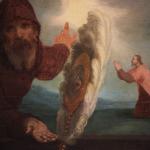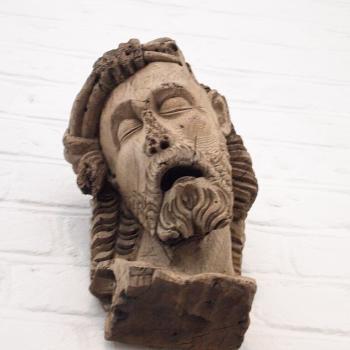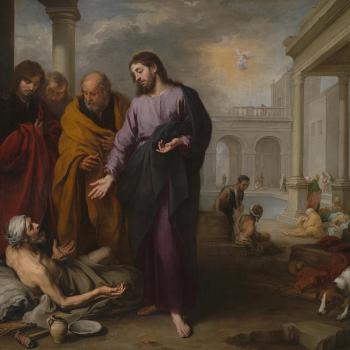
Paul talks about how he and the rest of the apostles had become spectacles for the world, not only to watch, but to ridicule. This was due to the fact that they radically followed the teachings of Christ, teachings which often went against the hopes and dreams of the elite. The apostles, indeed, Christians, were drawn to the very people society despised, the poor, the social outcasts, and showed them love. In doing this, the apostles were in solidarity with those the world had deemed to be worthless, feeling and experiencing the condemnation society gave to them: “For I think that God has exhibited us apostles as last of all, like men sentenced to death; because we have become a spectacle to the world, to angels and to men” (1 Cor. 4:9 RSV).
Paul indicated how it was not just humanity, but also angels, who watched the apostles and what they were doing, though of course, the reason the angels did so were not for the same reasons why humanity did so. The angels watched in wonder, while humanity watched as they watch anyone who apparently makes fools of themselves. For the apostles lived their lives as if they were among the worst of human society, as if they were among those condemned to die, becoming so like them, they actually would become those who were condemned. Because of this, because they felt they were among the condemned, that felt freed from social conventions – they found they could live their lives for Christ without care or concern about what others thought of them. They found themselves to be set free, and in their freedom, they were able to follow Christ and share the Gospel, becoming vessels of God’s deifying grace to the world. “We are fools for Christ’s sake, but you are wise in Christ. We are weak, but you are strong. You are held in honor, but we in disrepute” (1 Cor 4:10a RSV).
The apostles lived among the lowest of the low, those who society considers to have little to no value. Though treated with contempt, though considered to be like all those whom society rejects, they brought grace to the world, starting with those closest to them. In doing so, they found their work slowly brought grace to everyone, even to those who persecuted them. “To the present hour we hunger and thirst, we are ill-clad and buffeted and homeless, and we labor, working with our own hands. When reviled, we bless; when persecuted, we endure; when slandered, we try to conciliate; we have become, and are now, as the refuse of the world, the offscouring of all thing” (1 Cor 4:11-13 RSV). The apostle had Christ as their example: God became man, not as a rich man, not an elite man, but a man of the people, a man who lived with and held the court of the kingdom of God with the orphan, the widow, the poor, the homeless, indeed, the sinners whom the so-called righteous frowned upon.
Christ threw his lots with the poor, which is why Christ (and God, because Christ is God) can be found in their midst. Now, this does not mean we are to consider the poor with some sort of romantic affection, thinking all of them are pure and noble. Rather, we will find amongst them all kinds of people, those of noble character, and those who are not. Nonetheless, even those who are of low character, great sinners, who are found among the poor of society will find their impoverished walk in life connect them with Christ because Christ established his presence on earth amongst the poor. Thus, every one of the poor find, though they are considered the last of those society should help, are among the first whom Christ calls; even those among them who are great sinners find him calling to them, encouraging them to change and become better, giving them all they need in order to make it happen. They are among the first who share in the transforming grace of Christ, for, while the transformation and change in the world, while the eschatological kingdom of God, is first found amongst them, it will spread and be found throughout all creation, leaving no one behind.
The apostles, therefore, taking their place in the world where the incarnation happened, in and with the poor of the world, looked foolish to the elites because they rejected value that the elites placed on wealth and social standing. But the apostles had gained a wisdom which the elites had yet to learn, one which gave them a different value system, a system which showed how the elites of the world were the ones who were truly foolish. It was a wisdom which was hard earned for them, for, when we look to the Gospels, we find they often did not possess it, and so often came across as bumbling fools. They had faith, one which was inspired by and prompted by the work of the Holy Spirit in their lives, which is why they could and would slowly come to understand what Jesus taught them and put it into action. They often had questions and doubts, despite their faith, but because they were willing to put their faith above their questions, they were willing to follow even without total understanding, they were able to slowly gain the wisdom and understanding they lacked; if they could do it, so can we. This is why we should not worry when we, like the apostles, often appear to do foolish things or are confused as to what Christ wants for us, asking questions which make us seem to be ignorant, because Christ loves us and is longsuffering and patient with us, even as he was with his earliest disciples and the apostles. We should not be concerned about being foolish, whether in relation to social expectations, or in relation to the Christian faith; what we should be is open to Christ in faith and willingly accept we will often do things which the world, or other Christians, think is foolish, realizing what matters is our faith and love.
Stay in touch! Like A Little Bit of Nothing on Facebook.
If you liked what you read, please consider sharing it with your friends and family!
N.B.: While I read comments to moderate them, I rarely respond to them. If I don’t respond to your comment directly, don’t assume I am unthankful for it. I appreciate it. But I want readers to feel free to ask questions, and hopefully, dialogue with each other. I have shared what I wanted to say, though some responses will get a brief reply by me, or, if I find it interesting and something I can engage fully, as the foundation for another post. I have had many posts inspired or improved upon thanks to my readers.













